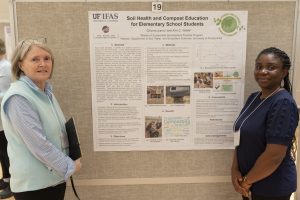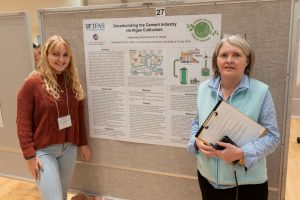University of Florida students are immersing themselves in the hands-on study of soil, water, and ecosystem sciences in the Experiential Learning Lab (ELL). Dr. Ann Wilkie, research professor in the UF/IFAS department of soil, water, and ecosystem sciences, leads the BioEnergy and Sustainable Technology (BEST) Lab, which also includes the ELL.

“I’m committed to providing hands-on research opportunities for students,” Wilkie said. “Our classes teach them what they should know. When they work in labs and conduct field research, that is where they gain first-hand knowledge and see the application.”
The goal of the Experiential Learning Lab is to involve students with actively contested questions, empirical observation, cutting-edge technologies, and the sense of excitement that comes from hands-on work to investigate important questions. Undergraduate research significantly contributes to a student’s learning and development, building self-confidence and fostering initiative, creativity, and accomplishment. Other benefits of active research for the student result from interaction with and guidance from a mentor, learning how scientists think, discovering how to overcome challenges, and learning about careers in science.
With Wilkie’s expertise in bioenergy and sustainable technologies, students at the ELL can participate in research on a range of topics. Those include biogas production from food waste and other organic wastes, algae cultivation for carbon capture and utilization, composting, soil carbon sequestration, and other sustainable practices.
After undergraduate student Hailey Muchnok spoke with Wilkie about her interest in composting and sustainable technologies, she enrolled in SWS 4911: Supervised Research in Soil, Water, and Ecosystem Sciences. During her mentored research in the spring 2023 semester, she worked with Wilkie in the ELL.
Muchnok and Wilkie focused on reducing greenhouse gas emissions from the cement industry.
“The completion of this research would have not been possible without the guidance and encouragement Dr. Wilkie provided,” Muchnok said.

Innovative Approach
A recent study found that traditional concrete and cement production contributes 10% to global energy-related CO2 emissions. This includes its transport, usage, and demolition. Wilkie proposes an innovative approach to reducing cement plant emissions. Using microalgae cultivation and anaerobic digestion could mitigate these emissions through a sustainable closed-loop system.
Microalgae, known for their high CO2 absorption rates, could be cultivated using cement flue gas. The microalgae, through photosynthesis, capture and store CO2 in their cells, providing a natural carbon-capture mechanism.
“Once cultivated, the microalgae biomass can be anaerobically digested to produce biogas, primarily methane,” Wilkie explained.
Muchnok reviewed the literature on methods by which microalgae could be cultivated to reduce CO2 emissions associated with cement production. That also included harvesting and anaerobic digestion of microalgae to produce biogas that could be used to power cement plants.
“Unlike conventional carbon capture and storage strategies, this biological approach captures carbon and repurposes it for renewable energy production. That’s effectively recycling CO2,” Wilkie explained.
This sustainable carbon capture and bioenergy approach could be applied to cement plants to reduce greenhouse gas emissions associated with the industry.
“Dr. Wilkie significantly enhanced my critical thinking skills and instilled in me a sense of confidence in my work,” Muchnok said.
Muchnok earned her B.A. degree in Sustainability Studies in May 2023. Before she graduated, Muchnok submitted the literature review she wrote with Wilkie to the UF Journal of Undergraduate Research. The research appears in the Fall 2023 issue. You can read the article here: https://doi.org/10.32473/ufjur.25.133485
“The publication, and the research process that led to it, have impacted the student author’s motivation to work on environmental problems in the future,” Wilkie said.
 4
4
